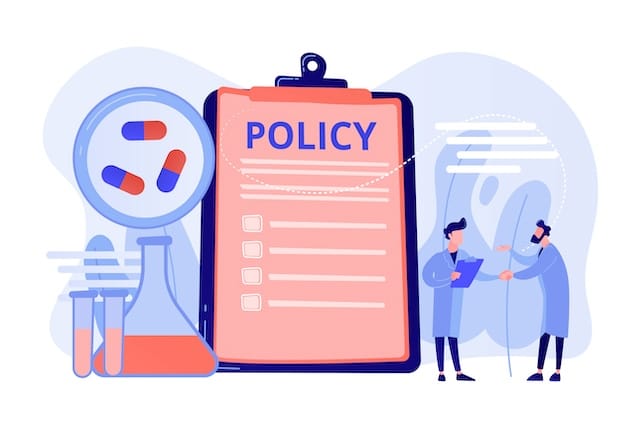7 Myths: Why Whole Life Insurance Is Actually A Bad Investment

Designed by Freepik
If you have been looking to buy life insurance, your insurance agent may have pitched a whole life insurance policy and touted its many benefits. In this blog post, we’ll evaluate the common claims about whole life insurance and evaluate whether these are in fact, the benefits they are marketed to be.
Here are some common myths about whole life insurance policies.
- Myth #1: Whole life insurance provides great lifetime insurance coverage
- Myth #2: Whole life insurance offers good investment returns
- Myth #3: Whole life insurance provides dual benefits – cash value and life insurance coverage
- Myth #4: Whole life insurance provides great tax benefits
- Myth #5: Whole life offers many miscellaneous benefits such as saving for college or saving for other large goals or expenses.
- Myth #6: Whole Life Insurance is a great estate planning option
- Myth #7: The insurance agent is advocating for whole life insurance, therefore it must be good for me.
Read our blog post on: Is Whole Life Insurance Worth It For Doctors?
Myth #1: Whole life insurance provides great lifetime insurance coverage
Most people do not need lifetime insurance coverage. You typically need life insurance coverage in the following scenarios:
- When you have a young family that is dependent on your income, it is important to have coverage to protect them should the unthinkable happen. But this period does not last your entire lifetime, only when your kids are in school or college, say for a period of 20 years or so. If you are at this stage of life, consider exploring our 8 Financial Planning Tips for Young Adults to optimize your family’s finances.
- You do not yet have enough assets built up that can cover living expenses or mortgages on your home.
As you get older, your kids will likely become financially independent and you will also have built up enough assets for your dependents to utilize in the event of your death.
For these reasons, term life is a better option than whole life insurance. It is about 5-10 times less expensive and provides coverage for 5, 10, 15 or 20 years – during the crucial time when life insurance is actually needed. You do not need to pay for an expensive whole life policy that offers lifetime protection that is actually not needed and costs significantly more.
Myth #2: Whole life insurance offers good investment returns
Whole life insurers offer a fixed rate of return on the cash value, which may seem like a good thing especially because many people believe that insurance companies have professional investment managers who can invest better than they themselves can. However, the reality is somewhat different.
The rates of return on whole life policies are between 1% to 3.5%. In comparison, the inflation-adjusted stock market returns between 1993 to 2023 were 7.22%. Moreover, when you invest in stocks directly, you have the flexibility to sell your investments and cash out at any time without the lock-in or penalties associated with whole life insurance.
Myth #3: Whole life insurance provides dual benefits – cash value and life insurance coverage
Insurance agents tout the dual benefits of whole life insurance - Not only do you get lifetime coverage, but also a cash value. Sounds like a bargain, right?
Not exactly.
If you use the cash value of a whole life policy, it reduces the death benefit, leaving less money for your beneficiaries. Similarly, if you take a loan against the cash value but do not repay the loan, this also reduces the death benefit. Therefore, make sure you understand this tradeoff and go in with eyes wide open.
Myth #4: Whole life insurance provides great tax benefits
It is true that the growth in the cash value of whole life insurance is tax-free. However, this is also true of tax advantaged retirement accounts such as the 401K or 403b, which are likely to have higher rates of return than whole life insurance if invested in stocks. So, first make sure you are maxing out on 401Ks and other retirement accounts before considering whole life insurance. Next, do the math to see if the lower rates of return on whole life insurance are compensated for by the tax-free growth. To see how these strategies might help you step away from work sooner, check out how to retire early at 55.
Myth #5: Whole life is a good option for college saving.
There are better ways to save for college such as 529s in which earnings are tax-deferred and withdrawals are tax-free if used for qualified educational expenses. Some states even offer deductions or credits for 529 contributions. On the other hand, if you take out a loan against your whole life insurance to pay for college, you have to pay interest on the loan. And if the loan is not repaid, it will reduce the death benefits for your beneficiaries. In sum, it is better to invest in 529s instead of relying on whole life insurance to pay for college. You can also learn how to estimate tuition goals through our college savings calculator.
Myth #6: Whole Life Insurance is a great estate planning option
Is this really the case? The answer is: It depends on whether you will have a large enough estate in the first place.
Most people are not likely to be high net worth individuals with a large asset value to leave to heirs. For most doctors and medical professionals, this is not the biggest consideration to buy a whole life insurance policy.
On the other hand, there may be some situations where whole life insurance may make sense:
For example, if you leave an estate worth more than $13.61M (or $27.22M for married couples), there is an estate tax of 40% to be paid within 9 months. In such cases, being able to access the death benefits immediately may help your heirs use this money to pay taxes without having to do a rushed sale of other assets, possibly at below-market value.
But for most people, even for high earners, the reality is that you are unlikely to leave behind such a large estate. Therefore the high premiums on whole life insurance may not be worth it for estate planning purposes. However, if you’re interested in taking your savings strategy even further, you might read about The Fat FIRE Approach to Financial Independence.
Myth #7: The insurance agent is advocating for whole life insurance, therefore it must be good for me.
The reality is that whole life insurance is good mostly for insurance agents and not their customers. Whole life commissions are the highest, and are often more than 100% of the total premiums for the policy’s first year. On the other hand, term life insurance pays the lowest premiums. Therefore, agents are not incentivized to sell term life policies, even though they are usually the best life insurance option for most people. If you are curious about the role of technology in your financial planning journey, take a look at Will AI Replace Financial Advisors?
At Planwell, we are building a fully automated AI financial planner and advisor to help you make super personalized financial decisions such as how to retire early and achieve financial independence & how much house you can afford, while considering your lifestyle, retirement goals and other key factors.
We will be launching the product very soon. Stay tuned for an update. In the meantime, check out our blog posts to help you plan your finances.
- What is the backdoor IRA process?: Learn about how to use the backdoor IRA to save more for retirement.
- Top 5 Books For Financial Literacy: Here are the best 5 books you can read to learn the fundamentals for financial literacy.
- How to build a personal financial plan: Before you make a home purchase, make sure to build your personalized financial plan with our 10 step guide.
- How to Use AI Budget Calculators and Tools to Plan Your Finances: Take advantage of our free FIRE calculator to plan your finances more effectively.
- 5 Common Money Mistakes to Avoid: Learn about the pitfalls that could derail your early retirement plans.
- 5 Overlooked Workplace Benefits That Can Save You Money: Maximize your work benefits to boost savings and well-being.
Related Posts
About
©2023 Planwell.io



